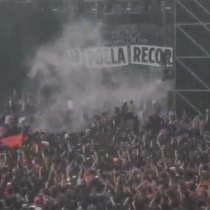
Images of the audience bursting onstage during the La Polla Records concert. The Spanish punk band had to finish their show, after a horde of attendees took the platform, taking away the microphone to replace the band’s slogans with their own. In their statement, the musicians apologised without disguising the disappointment: “We tried everything, but ultimately it could not be.”
They tried everything: they were not going to be frightened so easily, being part of a genre where the rises to the stage, more than common, are idiosyncrasies. The egalitarian spirit of punk can only reject unjustified hierarchies, especially if they come from the industrial machinery of music. Hence Johnny Rotten’s misunderstood T-shirt: “I hate Pink Floyd.” Hence also the mythical scenarios put at the level of the people, without elevations: here we are all the same.
And when the concerts were in danger, confrontations were not unusual. There are videos of Black Flag’s Henry Rollins, grabbing the T-shirt to whom ever he looks close to, and telling his fans to take that as a lesson not to stand in the way of the singer. Dave Grohl came out to defend Kurt Cobain when he got a punch while playing. G.G. Allin, who took punk to its most grotesquely unrecognizable extremes, put it without nuance: “In my concerts, you can challenge me; But you’re going to lose.”
This brutality generally had two senses. On the one hand, it guarded the common interest of the concert. Everyone was going to watch the band play, and a good singer couldn’t let an out-of-control fan ruin everything. On the other hand, he maintained that strict equality, that cult of self that permeated the whole movement. If you wanted to get on stage, you could do it, but you had to earn it.
Totally different from the picture the other day. A mob is not a person, and an invasion is not a challenge. It seems to me that, in a cultural force as teluric, as political as punk, any important event reflects some social trait. I also don’t think it’s mere coincidence that a foreign band had this happen to him in Chile, and it happened to him at this time.
I believe that the socio-political crisis we are going through is greater than the fall of neoliberalism; is the end of representation as we know it. What else can we believe, if we’re not even willing to allow someone to criticize the system on our behalf? It seems that we need to be the ones we are on the platform.
Ortega y Gasset warned him almost a century ago; he called it “rebellion of the masses.” It is the mass that happens to send, subverting social roles and hierarchies, however rational or beneficial they are. Ortega spoke of the “vertical invasion of the barbarians”. It’s scary how literal the concept is to describe what happened the other day.
The years have given us plenty of reasons not to buy all the elitist consequences of these ideas. But it is important to raise them the same; because they make us see the depth of this crisis that is now revealed to us, and that is not just national. Unjustified elites delegitimize and fall, as we have been waiting for centuries. But, in passing, let’s sweep with every work that doesn’t have us as protagonists. Political parties, both traditional and new, pathetically stun in the days. Populisms abound, because they speak to the ordinary citizen. Experts don’t matter: Trump tweets that global warming can’t be true if it’s cold.
It is no longer Ortega’s time; it’s the time of the Internet. The familiar misrule of social networks demands that we feel important constantly: it puts us at the center of politics, robbing us of the ability to organize, and thus realizing Marx’s fears of anarchism. Byung-Chul Han, a keen observer of new technologies, repairs how they have taken away our distance, absolutely necessary for respect. We are all constantly on top, and there are no leaders; all that remains is the swarm, without his own spirit, and with it, the overwhelming storm of disjointed opinions. It should come as no surprise that the phrases shouted into the microphone by those who seized it are the same ones that proliferate on social media. It is this swarm that took to the stage, who removed the distance, without understanding that respecting is not to humble oneself before the superiority of the other, but to be enlarged in the face of mutual equality, in the face of the equality of all. It is to recognize the importance of each other’s role, and the interests we share, that sister us.
When Ian MacKaye, the founder of Minor Threat and Fugazi, was asked what punk was to him, he said with his legend wisdom, “it’s free space, where you can create whatever you want.” But in the midst of the enraged conglomerate there is neither freedom nor space, and creation is unlikely. At the same time as we lay the foundations of old society, we must think about what we seek to build. Narcissism can only end in an easy nihilism. The hard part is finding rendering instances that really work; and perhaps it is more difficult to predispose ourselves, as a society, to accept them. If not, like the Spanish band, only defeat, frustration, and final, disbelieving apologies await us to those who expected more from us: “a fucking shame”.
The content poured into this opinion column is the sole responsibility of its author, and does not necessarily reflect the editorial line or position of El Mostrador.





